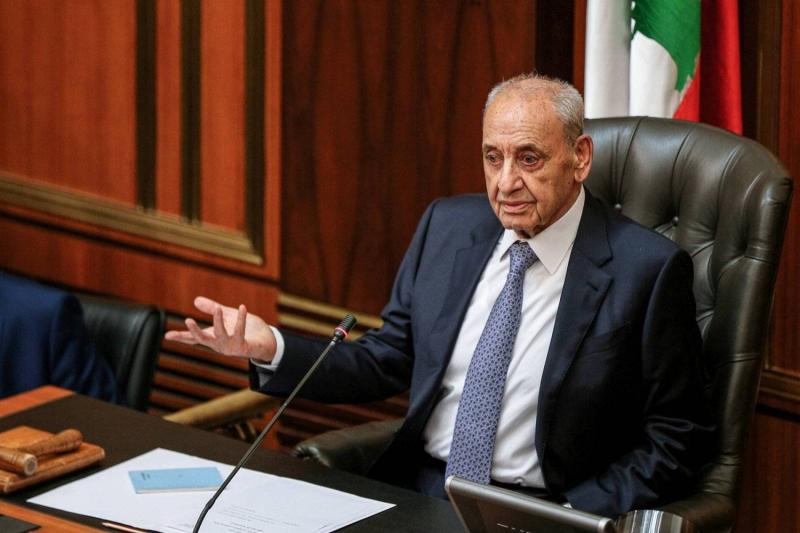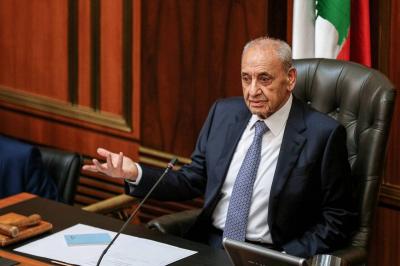Lebanese Parliament Speaker Nabih Berri stated that he rejects calls for deputies to dialogue or consult on an ad hoc basis, in order to extract the election of the President of the Republic from a vicious cycle. Berri expressed to "Asharq Al-Awsat" that he seeks an inclusive dialogue, given the exceptional circumstances Lebanon is currently facing. He emphasized that his call is not intended to isolate or undermine any party, indicating that “we, in the Amal Movement, and at the direction of its founder, Imam Musa Al-Sadr, were the first to oppose the decision made by the National Movement to isolate the Kataeb Party in the early days of the Lebanese Civil War in the spring of 1975."
He added, "We want to unite the Lebanese; there is an urgent need for collective efforts to save our country," stating: "We have had enough division and tearing apart, and the only option before us is consultation or dialogue. In ten days, we can end the presidential vacancy by electing a president, as it is a prerequisite for restoring order to constitutional institutions and making Lebanon fully prepared to face challenges, particularly since the region is gearing up for political arrangements that require us to unify our vision, so that solutions do not come at our expense."
Berri emphasized the urgent necessity of electing a President of the Republic to lead the Lebanese delegation in negotiations should a reconfiguration of the political map in the Middle East be decided. He asked: "What harm is there in everyone participating in consultations under unprecedented emergency circumstances? Is there a political obstacle preventing deputies from meeting despite their differences, so that dialogue might help bridge the gap between Lebanese? Who said that consultation constitutes a precedent in violating the constitution, especially since it is the gateway to paving the way for electing a president and closing the chapter on the presidential vacancy?"
**Unconditional Consultation**
Berri confirmed that there are no preconditions for the consultation, which is essential. He stated, "If we agree on a consensual candidate, he will receive all our welcome and support; otherwise, we will go to the parliament with a list of several candidates from whom deputies will elect the president in consecutive parliamentary sessions through multiple electoral rounds, provided that a two-thirds majority of the general assembly members is secured to elect him." This would help put an end to the obstruction of sessions due to the difficulty of securing the required number of deputies, i.e., the quorum, for their continuity.
Berri expressed satisfaction with the atmosphere that prevailed during his meeting with Vatican Secretary of State Pietro Parolin during his visit to Lebanon, and mentioned that he urged Christian leaders to cooperate to facilitate the election of the president. He affirmed that electing the president is like a key, without which we cannot move to the next step of organizing constitutional institutions by forming an effective government with a reformist economic program in cooperation with the parliament, as electing a president is not sufficient unless paired with the establishment of a rescue government.
Berri addressed the ongoing confrontation between Hezbollah and Israel on the southern front, stating that it is still under control within the rules of engagement. He mentioned that Hezbollah responds to the Israeli enemy's targeting of Lebanese depth by targeting Israeli depth, specifically military and security command centers, and military personnel gathering areas in barracks.
**Hoekstein Awaits Calm on the Gaza Front**
He noted that U.S. mediator Amos Hoekstein will automatically move between Tel Aviv and Beirut once a ceasefire between Israel and Hamas is reached on the Gaza front. He expected that in this case, Hoekstein would arrive in Lebanon at any moment to resume negotiations with him about calming the situation in the south, based on the implementation of Resolution 1701, which includes Israel's withdrawal from the Shebaa Farms and Kfarchouba Hills; as it explicitly states their return to Lebanon because they are part of its territory and should be subject to its sovereignty unconditionally.
Although Berri does not link a ceasefire on the Gaza and southern fronts to the election of a president, he views stopping Israel's aggression as an incentive to expedite the election of the president, stating, "Let us immediately proceed to consultation or dialogue, and then we will elect the president within ten days."
Berri noted the urgent need for cooperation to "bring the country together," asking: "What harm is there in dialogue or consultation? I had called for it more than a year and a half ago, and there is no interest in refusal just for the sake of refusal. No, there is a necessity to sit together, instead of exchanging political campaigns, or we will not find anyone abroad to help us unless we help ourselves. I dealt positively and realistically with the ambassadors of the Quintet to facilitate the election of the president."
**A Roadmap from the Opposition**
In this context, it is noteworthy that the combined opposition forces have completed a working paper, which they consider, from their perspective, a roadmap to extract the election of the president from stagnation and obstruction. They are preparing to announce its details at a press conference to be held on Tuesday afternoon at the parliament, followed by a parliamentary delegation representing them, consisting of: Ghassan Hasbani, Elias Hankash, Michel Douaihy, and Fouad Makhzoumi, delivering a copy of it at 4:00 PM on the same day to the ambassadors of the "Quintet": the American Lisa Johnson, the French Hervé Magro, the Saudi Walid Bokhari, the Egyptian Alaa Moussa, and the Qatari Abdulrahman bin Saud Al Thani, in a meeting at the French embassy in the Pine Palace, after which the opposition will continue to engage with parliamentary blocs to gauge their opinion regarding their presidential initiative.
Sources within the opposition told "Asharq Al-Awsat" that the working paper they prepared is part of launching a comprehensive initiative to elect the president based on constitutional foundations, and "we see it as the mandatory passage to facilitate his election; to stop playing for time to fill the void under the pretext of external conditions maturing," as the resistance axis bets. They confirmed that their approach to the presidential file is open to several options, without favoring the third presidential option, even as it subtly hints at it by abandoning its first option of supporting the candidacy of MP Michel Moawad in favor of supporting former minister Jihad Azour, while the other team continues to insist on the candidacy of former MP Sleiman Frangieh, the head of the Marada Movement.




